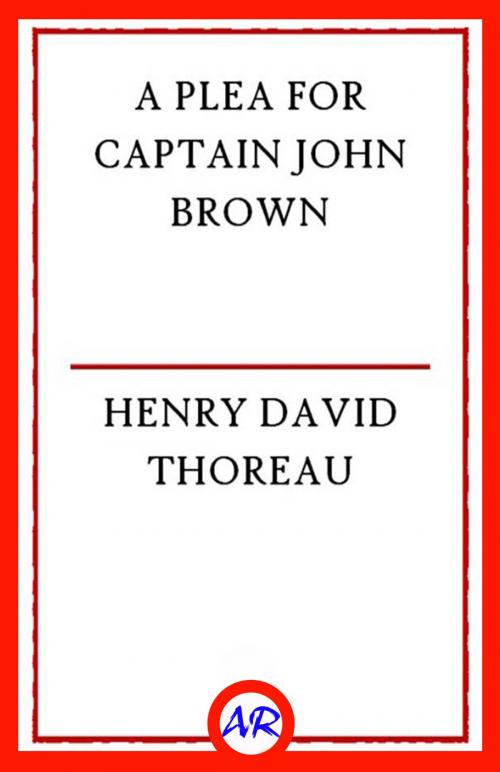| Author: | Henry David Thoreau | ISBN: | 1230000918770 |
| Publisher: | @AnnieRoseBooks | Publication: | February 1, 2016 |
| Imprint: | Language: | English |
| Author: | Henry David Thoreau |
| ISBN: | 1230000918770 |
| Publisher: | @AnnieRoseBooks |
| Publication: | February 1, 2016 |
| Imprint: | |
| Language: | English |
I trust that you will pardon me for being here. I do not wish to force my thoughts upon you, but I feel forced myself. Little as I know of Captain Brown, I would fain do my part to correct the tone and the statements of the newspapers, and of my countrymen generally, respecting his character and actions. It costs us nothing to be just. We can at least express our sympathy with, and admiration of, him and his companions, and that is what I now propose to do.
First, as to his history. I will endeavor to omit, as much as possible, what you have already read. I need not describe his person to you, for probably most of you have seen and will not soon forget him. I am told that his grandfather, John Brown, was an officer in the Revolution; that he himself was born in Connecticut about the beginning of this century, but early went with his father to Ohio. I heard him say that his father was a contractor who furnished beef to the army there, in the war of 1812; that he accompanied him to the camp, and assisted him in that employment, seeing a good deal of military life,—more, perhaps, than if he had been a soldier; for he was often present at the councils of the officers. Especially, he learned by experience how armies are supplied and maintained in the field,—a work which, he observed, requires at least as much experience and skill as to lead them in battle. He said that few persons had any conception of the cost, even the pecuniary cost, of firing a single bullet in war. He saw enough, at any rate, to disgust him with a military life; indeed, to excite in his a great abhorrence of it; so much so, that though he was tempted by the offer of some petty office in the army, when he was about eighteen, he not only declined that, but he also refused to train when warned, and was fined for it. He then resolved that he would never have anything to do with any war, unless it were a war for liberty.
I trust that you will pardon me for being here. I do not wish to force my thoughts upon you, but I feel forced myself. Little as I know of Captain Brown, I would fain do my part to correct the tone and the statements of the newspapers, and of my countrymen generally, respecting his character and actions. It costs us nothing to be just. We can at least express our sympathy with, and admiration of, him and his companions, and that is what I now propose to do.
First, as to his history. I will endeavor to omit, as much as possible, what you have already read. I need not describe his person to you, for probably most of you have seen and will not soon forget him. I am told that his grandfather, John Brown, was an officer in the Revolution; that he himself was born in Connecticut about the beginning of this century, but early went with his father to Ohio. I heard him say that his father was a contractor who furnished beef to the army there, in the war of 1812; that he accompanied him to the camp, and assisted him in that employment, seeing a good deal of military life,—more, perhaps, than if he had been a soldier; for he was often present at the councils of the officers. Especially, he learned by experience how armies are supplied and maintained in the field,—a work which, he observed, requires at least as much experience and skill as to lead them in battle. He said that few persons had any conception of the cost, even the pecuniary cost, of firing a single bullet in war. He saw enough, at any rate, to disgust him with a military life; indeed, to excite in his a great abhorrence of it; so much so, that though he was tempted by the offer of some petty office in the army, when he was about eighteen, he not only declined that, but he also refused to train when warned, and was fined for it. He then resolved that he would never have anything to do with any war, unless it were a war for liberty.















